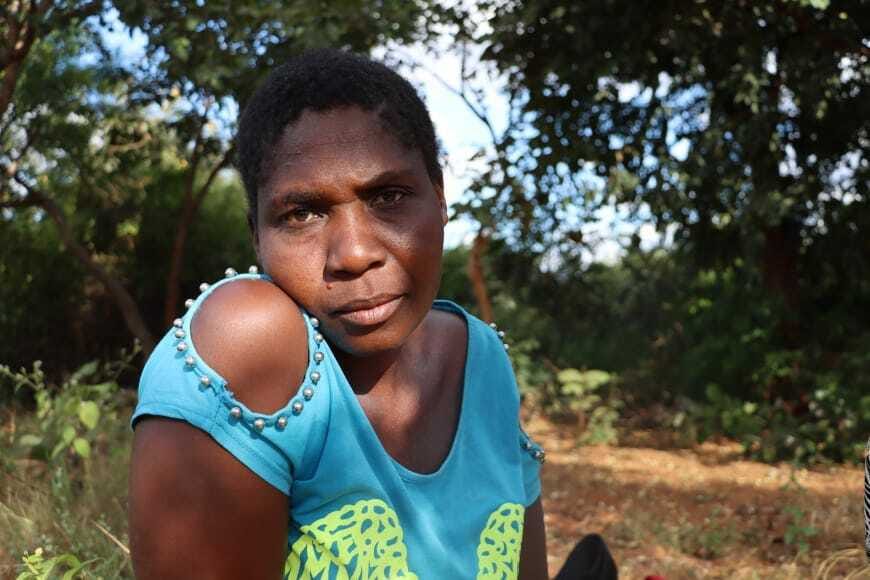
She felt all that excruciating pain in the name of marriage.
The physical pain she experienced on the ‘Lovers’ Day’ was reminiscence of the deeper psychological wounds she had gone through the past 14 years in marriage.
One early evening of February 14, 2021, the Valentine’s Day, would have been her date of death had there been no neighbours around.
Coincidentally, the perpetrator, her husband of 14 years, has been sentenced to 14 years in prison with hard labour (IHL) for causing grievous harm, to reform and to deter would-be offenders of Gender Based Violence (GBV).
The heinous act left Hannah Kafantenganji deformed, scared all over her body.
She worries she might not be spotted by another suitor due to scars that have dented her feminine skin tone.
“Who would be interested in a woman with scars all over her body? I’m completely deformed,” she grieved.

When lovers in their homes shared roses, the once light skinned Hanna was having a solo evening fire bask outside her makeshift grass thatched hut as water boiled on her cray charcoal stove.
The inside was dark, she said she did not have reason to light a candle when there was no one inside. Her husband was out for a booze.
Little did she know the emergence of her husband would result into suspicions of valentine’s unfaithfulness.
The unlit house was perceived as an act of harboring a lover in the house.
In a twitch of the eye, the situation turned ugly, he poured boiling water over her, climaxing the physical abuse she had experienced over the past 14 years in marriage.
She was scalded all over with very little chances of surviving, her auntie, widow to late Kafantenganji said.
“Hannah had been scalded all over. Water oozed and soaked all the linen we had wrapped her on. The burns were very deep,” she said in stitches.
Her neighbours and friends rushed her to hospital where they were told chances of survival were very slim due to the degree of the burns.
Violence was common in Hannah’s marriage, it started a year soon they married.
Hannah was only 17 by then, she recalled.
Her aunt said she regrets to have encouraged Hannah to persevere marital abuses.
“I regret not to have taken Hannah’s complaints of violence in her marriage seriously. Love is not perseverance, it is kind and care,” Kafantenganji regrated.
Members from the Malawi Council of Churches (MCC) kept visiting and offering her moral, spiritual, and material support including paying for her hospital bills.
In Malawi, the prevalence of domestic violence among the ever-married women perpetrated by their current or most recent spouse (physical, sexual, or emotional) is estimated as 42%, higher than the global estimate of intimate partner violence (NSO-Malawi & DHS Program, 2017).
GBV is mostly perpetrated by acquaintances to the victims with promises of change.
According to Nellie Mngwaluko, GBV Officer at NCA/DCA Malawi Country Office, GBV in Malawi is rampant despite several interventions.
“GBV is highly rampant in Malawi. Currently 1 in 3 women and girls aged 15-49 experience physical or sexual violence. The problem has also been aggravated by COVID-19,” asserts Mngwaluko.
A renowned professional counsellor and National Coordinator for the Malawi Association of Counsellors (MAC), Sr Huguette Ostiguy, MIC says marriage is not about perseverance, but an institution where members should strive to support one another to grow and be happy in life.
Ostiguy asserts, “Promises of change are mostly manipulations to continue abusing the victim. Victims should not expect the perpetrator to change until they themselves say no to abuse. Victims must realise they are human beings, and they have the right to be treated properly. Nothing changes until the victim changes and takes the courage to stand on their own feet and say no to abuse”.
Malawi Council of Churches (MCC) works in Dowa to end GBV in communities and empower victims of GBV to speak out and report human rights abuses in homes and community, courtesy of the funding from the Royal Norwegian Embassy through the Norwegian Church Aid.